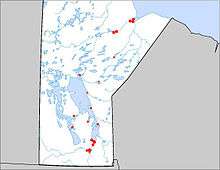Bungi Creole
| Bungi | |
|---|---|
| Bungee, Bungay, the Red River Dialect | |
| Native to | Canada |
| Region | Red River Colony and Assiniboia, present-day Manitoba |
Native speakers | < 500 likely extinct (date missing) |
| Language codes | |
| ISO 639-3 |
None (mis) |
| Glottolog | None |
|
Geographical distribution of Bungee | |
Bungi (also Bungee, Bungie, Bungay, or the Red River Dialect) is a creole language of English (Scottish dialect), Scots (Orcadian dialect), Scottish Gaelic, Cree and Ojibwe,[1] and spoken by the Red River Métis in present-day Manitoba, Canada.
Bungi has been categorized as a post-creole,[2] with the distinctive features of the language gradually abandoned by successive generations of speakers in favour of standard Canadian English. Today, the creole mostly survives in the speech of a few elders, and the use of non-standard pronunciations and terminology by a wider population.
Name
The name derives from either Ojibwe: bangii, or Cree: pahkī, both words meaning “a little bit”. In addition to describing the language, Bungi can refer to First Nations persons generally, or those with mixed European and First Nations ancestry (regardless of perceived cultural affiliation).[3] In these colloquial uses the term may have mildly pejorative connotations, even when used by speakers to describe themselves.[4]
Description
| Scots language |
|---|
| History |
| Dialects |
The lexicon is mostly English with words from Cree and Ojibwa interspersed throughout.
Social context
Many speakers in Blain’s studies were ashamed to speak the dialect as the speech community members were discriminated against by other groups.
The major difference with other dialects is in the phonology (sound system and pronunciation). Voice quality differences are noticeably apparent.
Scholarship
The main linguistic documentation of this dialect lies within Blain (1987, 1989) and Walter (1969–1970).
See also
- Scottish Indian trade
- Red River Colony
- Michif language
- Anglo-Métis
- Métis National Council
- Scottish Gaelic
- Newfoundland Irish
- Canadian Gaelic
- Chinook Jargon
- Beurla Reagaird
- Scots language
Notes and references
Notes
References
- Bakker, Peter & P. Grant. Atlas of Languages of intercultural communication in the Pacific, Asia, and the Americas. Interethnic Communication in Canada, Alaska, and adjacent areas.
- Barkwell, Lawrence J., Dorion, Leah; & Hourie, Audreen. (2006). Metis legacy: Michif culture, heritage, and folkways. Métis legacy series (Vol. 2). Saskatoon: Gabriel Dumont Institute. ISBN 0-920915-80-9
- Barkwell, Lawrence J., Dorion, Leah; & Préfontaine, Darren R. (n.d.). Annotated bibliography and references in Metis legacy.
- Blain, Eleanor M. (1987). Speech of the lower Red River settlement. In W. Cowan (Ed.), Papers of the eighteenth Algonquian Conference (pp. 7–16). Ottawa: Carleton University.
- ––– (1989). The Bungee dialect of the Red River settlement. (MA thesis, University of Manitoba).
- ––– (1994). The Red River dialect. Winnipeg: Wuerz Publishing.
- ––– (n.d.). Bungee. The Canadian Encyclopedia.
- Cansino, Barbara. (1980, March 26). Bungi in Petersfield: An 81 year old writes about the Red River dialect. Winnipeg Free Press.
- Carter, Sarah. Aboriginal people and colonizers of Western Canada to 1900.
- Dollinger, Stefan. New-dialect formation in Canada: evidence from the English modal auxiliaries.
- Gold, Elaine. (2007). Aspect in Bungi: Expanded Progressives and Be Perfects. Congrès de l’ACL 2007 / CLA Conference 2007. Toronto: University of Toronto.
- Pentland, David H. (1985, March 9). Métchif and Bungee: Languages of the fur trade. (Paper presented in the series Voices of Rupert's Land: Public Lectures on Language and Culture in Early Manitoba.
- Scott, S. Osborne; & Mulligan, D. A. (1951, December). The Red River dialect. The Beaver, 42–45.
- ––– (1951). The Red River dialect. In J. K. Chambers (Ed.), Canadian English: Origins and structures (pp. 61–63). Toronto: Methuen.
- Stobie, Margaret. (1967–1968). Backgrounds of the dialect called Bungi. Historical and Scientific Society of Manitoba, 3 (24), 65–67.
- ––– (1971). The dialect called Bungi. Canadian Antiques Collector, 6 (8), 20.
- Swan, Ruth Ellen. (1991). Ethnicity and the Canadianization of Red River politics (p. 133). (MA thesis, Winnipeg, University of Manitoba).
- Walters, Frank J. (1969–1970). Bungee as she is spoke. Red River Valley Historian and History News. The Quarterly Journal of the Red River Valley Historical Society, 3 (4), 68–70.
- Wurm, Stephen A.; Mühlhäuser, Peter; & Tryon, Darrell H. (Eds.). (1996). Atlas of languages of intercultural communication in the Pacific, Asia, and the Americas (Vol. II.2). Trends in linguistics: Documentation (No. 13). Berlin: Mouton de Gruyter.

